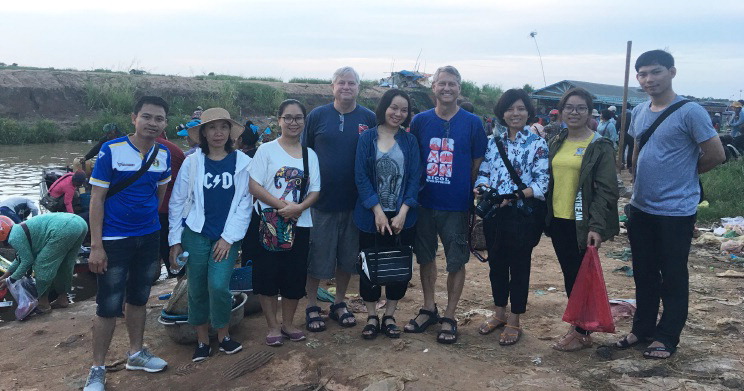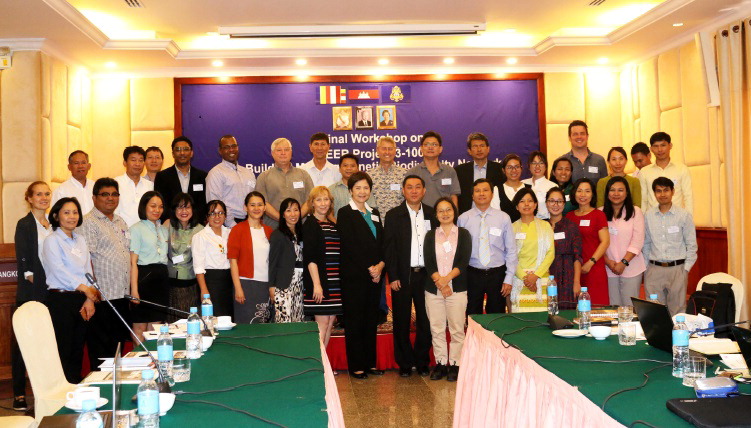|
Cycle 6 (2017 Deadline)
Riverscape Genetics to Inform Natural History of Exploited Fishes in the Lower Mekong River Basin
PI: Dang Thuy Binh (binhdangthuy@gmail.com), Institute for Biotechnology and Environment, Nha Trang University (NTU); with co-PIs Chheng Phen(chhengp@yahoo.com) (deceased), Inland Fisheries Research and Development Institute (IFReDI); Latsamy Phounvisouk (meetouna@yahoo.com), Living Aquatic Resources Research Center (LARReC); Chaiwut Grudpan (k_chaiwut@hotmail.com), Ubon Ratchathani University (UBU); and Mie Mie Kyaw (mmkama74@gmail.com), University of Mandalay
U.S. Partner: Jeffrey Williams, Smithsonian Institution
Project Dates: December 2017 - April 2023
Project Facebook Page: https://www.facebook.com/MRB-BioNetwork-250046029052455/
Project Overview
Riverscape genetics, or the influence of hydrographic features on the genetics and ecology of fish populations still and moving water, is a young discipline. There have been several temperate riverscape studies with a few tropical studies – limited mostly to the Amazon and Australia. As a result, very little is known about the population genetics of fishes in the Mekong River Basin (MRB), which is characterized by complicated hydrographic features, including wide seasonal fluctuations in flow and ongoing changes from already constructed and planned hydropower dams.
This PEER project supported the completion of population genetic studies of 14 species across 26 MRB locations from Myanmar to the Vietnam delta, augmenting information on two species collected and analyzed during the PI’s project in PEER Cycle 2, adding new localities to species collected in PEER Cycle 3, and add an additional six species not already covered in previous PEER projects. The PEER team undertook advanced genomic analyses, providing important information on the population structure, effective population size, and directionality of gene flow of Mekong River fishes. The extent of collection sites throughout the Lower Mekong Basin and the number of species in this study provide the basis for the first ever comparative riverscape genetic analysis of fishes of tropical Southeast Asia. This project solidified collaborations initiated during the Cycle 3 project, including researchers in four Lower Mekong Basin partner countries (Cambodia, Laos, Thailand, and Vietnam) and expanded the work to researchers and a collection site in Myanmar.
 |  | | The team pauses for a picture during sample collection at Tonle Sap Lake. | Participants of kick-off meeting in Siem Reap, Cambodia (photo courtesy of Dr. Binh). |
Final Summary of Project Activities
Field work was the primary focus of this project, and the researchers remained in regular contact, including annual project meetings, to ensure they were all in agreement on sampling protocols and selection of target species. The PEER team collected samples through the end of 2022, and after long delays due to COVID pandemic-related travel restrictions in the region, all collaborators were able to deliver fish specimens to Nha Trang University (NTU) by March 2023. NTU staff extracted DNA from more than 100 fish specimens and sent the results to Texas A&M University for DNA library preparation and sequencing while continuing to work on data analysis.
In Laos, the PEER team organized a training course for university staff on identification of the key characteristics of the target fish species, how to take fish tissue for DNA analysis and how to preserve the samples.
A final workshop was held at NTU to exchange knowledge and explore new opportunities. Researchers presented five studies on different topics related to freshwater fish, including biodiversity, aquaculture, ecology and population genetics and summarized the PEER project results. A doctoral student researcher on the PEER team won the VinIF Foundation scholarship for the third consecutive time, and the PIs have been awarded $300,000 between two new grants to continue work on DNA studies as well as restoration of mangrove forests.
During the final workshop, PEER team members commemorated the life of co-PI Dr. Chheng Phen of the Cambodian Inland Fisheries Research and Development Institute (IFReDI) who died in 2022. Colleagues noted his kindness, humility, good humor, and willingness to share his exceptional knowledge of Mekong fisheries. He was an outstanding teacher and mentor to his students, an irreplaceable expert and leader in his field, and a treasured friend who will be greatly missed by his many colleagues and associates worldwide. PEER offers its deepest condolences to his family and friends.
Publications
Oanh Thi Truong, Sang Quang Tran, Quyen Dang Ha Vu, Van Ngo Thai Bich, Binh Thuy Dang. 2022. Comparative tools for de novo genome assembly: Apply in population genetics of Mekong fish species, Pangasius larnaudii (Siluriformes: Pangasiidae). Proceeding books in 7th Asia Pacific International Modern Sciences Congress, Jakarta, Indonesia, ISBN 978-625-8246-59-9.
Oanh T. Truong, Sang Q. Tran, Binh T. Dang. 2022. Complete mitochondrial genomes of peacock eel (Macrognathus siamensis) and phylogenetic relationships among Synbranchiformes. ASEAN – FEN 10th International Fisheries Symposium 2022, Nha Trang, Vietnam.
Sang Q. Tran, Oanh T. Truong, Quyen D.H. Vu, Binh T. Dang. 2022. Mitochondrial genome-wide analysis: Phylogenetic network and divergent timeline of Pangasiidae. ASEAN – FEN 10th International Fisheries Symposium 2022, Nha Trang, Vietnam. https://ifs2022.ntu.edu.vn/
Truong, T.O., Tran, Q.S., Vu, D.H.Q., and Dang, T.B. 2021. Genetic diversity and population structure of Lethrinus lentjan (Lethrinidae) in Vietnam based on SNP markers. SPAST Abstracts, 1(01). Retrieved from https://spast.org/techrep/article/view/1306
Biesack, E.E., B.T. Dang, A.S. Ackiss, C.E. Bird, P. Chheng, L. Phounvisouk, O.T. Truong, and K.E. Carpenter. 2020. Evidence for population genetic structure in two exploited Mekong River fishes across a natural riverine barrier. Journal of Fish Biology. See https://doi.org/10.1111/jfb.14424.
Achkiss, A.S., B.T. Dang, C.E. Bird, E.E. Biesack, P. Chheng, L. Phounvisouk, Q.H.D. Vu, S. Uy, and K.E. Carpenter. 2019. Cryptic lineages and a population dammed to incipient extinction? Insights into the genetic structure of a Mekong River catfish. Journal of Heredity 110(5): 535-547. See https://doi.org/10.1093/jhered/esz016.
Dang, B.T., Q.H.D. Vu, E.E. Biesack, T.V. Doan, O.T. Truong, T.L. Tran, A.S. Achkiss, B.L. Stockwell, and K.E. Carpenter. 2019. Population genomics of the peripheral freshwater fish Polynemus melanochir (Perciformes, Polynemidae) in a changing Mekong Delta. Conservation Genetics 20: 961-972. See https://doi.org/10.1007/s10592-019-01189-x.
In October 2020, the international science website SciDev.Net Asia & Pacific published a story on this PEER team's research in the Mekong: https://www.scidev.net/asia-pacific/role-models/save-mekong-s-rich-biodiversity-for-future-generations/
Back to PEER Cycle 6 Grant Recipients
|
|
|
|





